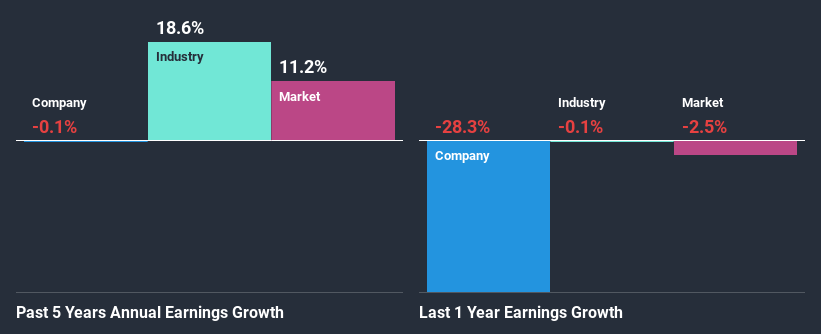- India
- /
- Trade Distributors
- /
- NSEI:VINYLINDIA
Vinyl Chemicals (India) Limited (NSE:VINYLINDIA) Stock Is Going Strong But Fundamentals Look Uncertain: What Lies Ahead ?

Most readers would already be aware that Vinyl Chemicals (India)'s (NSE:VINYLINDIA) stock increased significantly by 33% over the past three months. But the company's key financial indicators appear to be differing across the board and that makes us question whether or not the company's current share price momentum can be maintained. Particularly, we will be paying attention to Vinyl Chemicals (India)'s ROE today.
ROE or return on equity is a useful tool to assess how effectively a company can generate returns on the investment it received from its shareholders. Simply put, it is used to assess the profitability of a company in relation to its equity capital.
Check out our latest analysis for Vinyl Chemicals (India)
How Do You Calculate Return On Equity?
ROE can be calculated by using the formula:
Return on Equity = Net Profit (from continuing operations) ÷ Shareholders' Equity
So, based on the above formula, the ROE for Vinyl Chemicals (India) is:
13% = ₹77m ÷ ₹594m (Based on the trailing twelve months to December 2020).
The 'return' refers to a company's earnings over the last year. One way to conceptualize this is that for each ₹1 of shareholders' capital it has, the company made ₹0.13 in profit.
What Is The Relationship Between ROE And Earnings Growth?
So far, we've learned that ROE is a measure of a company's profitability. Depending on how much of these profits the company reinvests or "retains", and how effectively it does so, we are then able to assess a company’s earnings growth potential. Generally speaking, other things being equal, firms with a high return on equity and profit retention, have a higher growth rate than firms that don’t share these attributes.
A Side By Side comparison of Vinyl Chemicals (India)'s Earnings Growth And 13% ROE
When you first look at it, Vinyl Chemicals (India)'s ROE doesn't look that attractive. Although a closer study shows that the company's ROE is higher than the industry average of 5.1% which we definitely can't overlook. However, Vinyl Chemicals (India) has seen a flattish net income growth over the past five years, which is not saying much. Bear in mind, the company does have a slightly low ROE. It is just that the industry ROE is lower. So that could be one of the factors that are causing earnings growth to stay flat.
We then compared Vinyl Chemicals (India)'s net income growth with the industry and found that the average industry growth rate was 19% in the same period.

Earnings growth is an important metric to consider when valuing a stock. The investor should try to establish if the expected growth or decline in earnings, whichever the case may be, is priced in. By doing so, they will have an idea if the stock is headed into clear blue waters or if swampy waters await. If you're wondering about Vinyl Chemicals (India)'s's valuation, check out this gauge of its price-to-earnings ratio, as compared to its industry.
Is Vinyl Chemicals (India) Using Its Retained Earnings Effectively?
Vinyl Chemicals (India) has a high three-year median payout ratio of 54% (or a retention ratio of 46%), meaning that the company is paying most of its profits as dividends to its shareholders. This does go some way in explaining why there's been no growth in its earnings.
Moreover, Vinyl Chemicals (India) has been paying dividends for at least ten years or more suggesting that management must have perceived that the shareholders prefer dividends over earnings growth.
Summary
In total, we're a bit ambivalent about Vinyl Chemicals (India)'s performance. Specifically, the low earnings growth is a bit concerning, especially given that the company has a respectable rate of return. Investors may have benefitted, had the company been reinvesting more of its earnings. As discussed earlier, the company is retaining a small portion of its profits. Until now, we have only just grazed the surface of the company's past performance by looking at the company's fundamentals. You can do your own research on Vinyl Chemicals (India) and see how it has performed in the past by looking at this FREE detailed graph of past earnings, revenue and cash flows.
When trading Vinyl Chemicals (India) or any other investment, use the platform considered by many to be the Professional's Gateway to the Worlds Market, Interactive Brokers. You get the lowest-cost* trading on stocks, options, futures, forex, bonds and funds worldwide from a single integrated account. Promoted
New: Manage All Your Stock Portfolios in One Place
We've created the ultimate portfolio companion for stock investors, and it's free.
• Connect an unlimited number of Portfolios and see your total in one currency
• Be alerted to new Warning Signs or Risks via email or mobile
• Track the Fair Value of your stocks
This article by Simply Wall St is general in nature. It does not constitute a recommendation to buy or sell any stock, and does not take account of your objectives, or your financial situation. We aim to bring you long-term focused analysis driven by fundamental data. Note that our analysis may not factor in the latest price-sensitive company announcements or qualitative material. Simply Wall St has no position in any stocks mentioned.
*Interactive Brokers Rated Lowest Cost Broker by StockBrokers.com Annual Online Review 2020
Have feedback on this article? Concerned about the content? Get in touch with us directly. Alternatively, email editorial-team (at) simplywallst.com.
About NSEI:VINYLINDIA
Flawless balance sheet established dividend payer.
Similar Companies
Market Insights
Community Narratives




